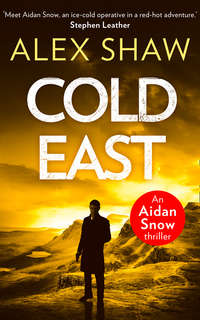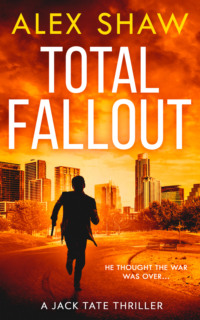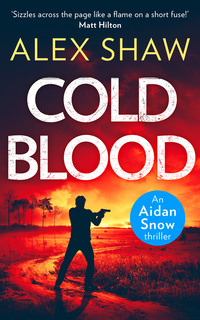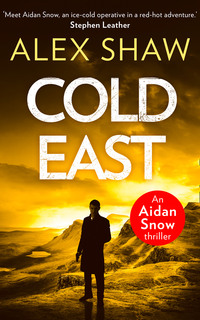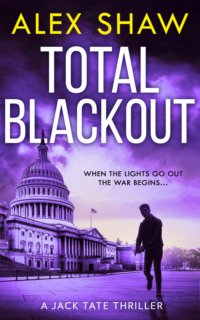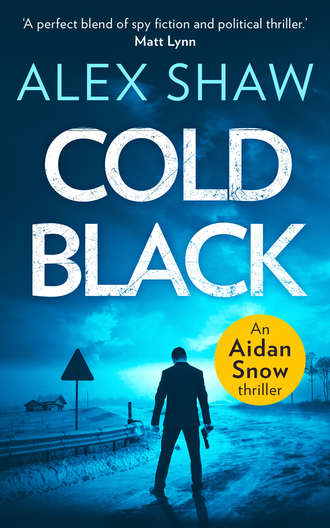
Полная версия
Cold Black
‘No.’
‘Eat.’ Fox slapped two eggs, three rashers of bacon, and a pair of sausages onto a plate. ‘For tomorrow we may die.’
Arizona Bar and Grill, Kyiv, Ukraine
Gennady Dudka was looking forward to seeing his oldest friend, Leonid Sukhoi. He crossed his arms and smiled, reminiscing about times long ago. They had been conscripts together in the Red Army before being selected for the KGB Border Guards, where they had both stayed and risen through the ranks until Sukhoi transferred back to his native Belarus and Dudka returned to his homeland of Ukraine. They had met up as frequently as work would allow over the years and had enabled as much collaboration as possible between their two KGB divisions.
Then, however, 1991 happened and the mighty Soviet Union imploded. The two friends found themselves working for different countries, Sukhoi now employed by the Belarusian KGB and Dudka by the Ukrainian SBU, Ukraine having dropped the Soviet name but not much else. As the Nineties and the new millennium passed, Ukraine had gradually stepped out of the shadows of the former Soviet Union and was walking, if slowly, towards the West and the EU. Belarus, on the other hand, had tried to rebuild the Union and sought to create, first, a ‘Belarusian and Russian Union’ and then a ‘Greater Slavic State’ with Russia, Yugoslavia – as was – and Ukraine. Yugoslavia had crumbled into civil war before they had a chance to sign up, and Ukraine hadn’t answered the door to their neighbour; they were busy entertaining their new visitor – the West. Now isolated by all but the infamous ‘Axis of Evil’ and Russia, Belarus was alone and mainly ignored, a remnant of the Soviet Union that neither fitted into the past nor the new democratic future of Europe.
Dudka hadn’t seen his friend for… he counted on his fingers… close to three years. He frowned. Had it really been so long since Leonid’s granddaughter married her own ambitious KGB officer from Minsk? Time had passed in an instant; now both in their early seventies, Dudka had started to realise that Leonid and he didn’t have all that much time left. Dudka was in as rude health as ever, but he feared for his friend, who, although taller, had always been ‘delicate’. He made a resolution to keep in touch more, in future, with those who mattered to him most.
The restaurant had started to fill up with early Sunday customers; it was just after twelve and Leonid was due any moment. The waitress again asked Dudka if he was ready to order, and for the second time he told her he was waiting for someone and could she just bring him a glass of water and turn the air conditioning down? He shivered; outside it was a balmy, early September day, but here it felt like the midst of winter. His water arrived, complete with ice cubes – an American idea. He gave the waitress a withering look. Not taking the hint, she left as he noticed his old friend enter the room.
Dudka smiled broadly and held out his arms, shook Leonid’s hand, and then embraced him. ‘My dear friend. How good it is to see you!’ He meant it; he loved Leonid like a brother.
Sukhoi also smiled but not quite as warmly. ‘You too, old rogue.’
Dudka took a step back and regarded his friend; he had put on some weight, his shirt and jacket seemed a bit tight, and he did not seem at ease. They sat.
‘I trust it was a good flight from Minsk International?’ It was a joke; neither the airport nor the airline were truly international.
Sukhoi smiled half-heartedly.
Dudka frowned. ‘What’s the matter?’
They paused while the waitress brought more water and ordered quickly before she had a chance to leave.
Sukhoi drank his water then mopped his brow; he was sweating. ‘Genna, you are the only one I can speak to. You are the only one I trust.’
Dudka’s expression turned serious. ‘Whatever I can do to help, I will – you know that, Leonya.’
The head of the Belarusian KGB’s third directorate nodded. He was in a dangerous position; so dangerous, in fact, that he had had to leave the country he commanded and enter Ukraine to seek help. He glanced around the restaurant. He had initially chosen it at random but was later happy to find it was an ex-pat favourite – not many old Soviets.
‘There are certain elements in my government that would seek to destroy my country.’ Sukhoi’s tone was serious. His words hung in the air as their soup arrived, Borsch being one of the only Ukrainian dishes on the menu.
‘Lukachev has done a good job so far; I say let him finish.’ Dudka dipped his roll then took a soggy bite; his comment was laced with sarcasm.
Sukhoi noticed a crumb fall onto his friend’s tie. It was no secret between them that neither was enamoured of the Belarusian leader. The problem was that like-minded men in Belarus were hard to find. All those of their age had too much to lose and the younger generations had been indoctrinated during the overlong years of Lukachev’s rule.
‘Something terrible is being planned, something that would almost certainly bring about the destruction of the Belarusian nation.’
Dudka’s spoon stopped and its contents fell back into the bowl, splattering his tie. His friend was being even more alarmist than usual. ‘What is this about?’
The KGB man swallowed hard. The restaurant was fine for making contact but he couldn’t take any more chances. ‘Is there somewhere we can go that is secure?’
Dudka narrowed his eyes. ‘Yes. You are serious?’
Sukhoi nodded. ‘I need help, Genna.’
Dudka knew not to push the matter any further. Both men sat in silence and finished their soup, neither having an appetite for a main course.
Dudka paid and they left. He had parked his government-issue Volga outside. The SBU’s younger men had been given new Volkswagen Passats but he preferred his Volga. He nodded at the restaurant’s security guard, who, dressed in full urban grey and blue camouflaged fatigues, looked more like a commando than a glorified doorman, and unlocked the car parked just outside. Traffic rumbled past them along the Naberezhno-Khreshatik, the riverside highway that neatly dissected Kyiv.
Sukhoi looked around nervously as he opened the passenger door. Suddenly he groaned and fell forward onto the bonnet before sliding off and onto the asphalt.
‘Leonya!’ Dudka moved swiftly, for a man of his age, around the far side of the car. He heard a sound like heavy hailstones and saw Sukhoi’s body convulse. Dudka threw himself to the floor. Someone with a silenced weapon was shooting at them! Lying flat on his face, he reached out to grab Sukhoi’s hand. Something hit him and there was a sharp, stinging sensation on his face. Dudka winced but reached out again. He couldn’t feel a pulse. Raising his head, he saw an Audi 80 parked on the other side of the road pull off in the direction of the new bridge and the city’s left bank.
Moving with more speed than he had done in twenty years, Dudka was up and firing his service-issue Glock 9mm at the disappearing target. The shots were wild except for one, which smashed the rear windscreen. Dudka turned back to his best friend, who lay motionless at his feet; there were specks of blood behind his head.
Chapter 4
King Khalid Airport, Kingdom of Saudi Arabia
For the past ten minutes the passengers around Fox had formed long queues for the toilets on the Riyadh-bound Boeing 747. Once in the tiny cubicles they removed their Western clothes and replaced them with Arab robes. The cabin changed from a sea of coloured shirts to an almost monochrome of men in white thobes and women in jet-black abayas. The only flashes of colour now came from the red-chequered headdresses of the Saudi men and the few remaining Westerners.
Just before they entered Saudi airspace the chief flight attendant announced that, to comply with the law of the land, the bar would now be closed. The cabin crew would collect all miniatures and empty glasses. Unlike other flights, no one here dared hide a bottle in their pocket for later. Alcohol was strictly forbidden in the Kingdom of Saudi Arabia. It was a good job the content of the passengers’ stomachs wasn’t scanned, Fox thought to himself. He had never seen so much booze being put away on a commercial flight; it had been like a knees-up at Stirling Lines!
Thirty-five minutes later, his seat upright and tray stowed, Fox braced himself for landing. He didn’t fear flying; he feared crashing. As the plane touched down there was applause from the locals returning to the Kingdom; the ex-pats, however, didn’t look pleased. No sooner had the aircraft come to a halt than the Saudis were standing and removing their bags from overhead lockers. The flight crew asked for all passengers to remain seated once, then a second time, then gave up.
Fox collected his rucksack from the overhead locker and exited the plane. He looked wistfully at the grinning cabin crew, realising this was probably the last time he would see female flesh for a while. Stepping out of the fuselage, the heat hit him like a wall. The temperature was in the forties and he immediately felt drowsy. Alcohol, heat, and tiredness did not a good mix make. The short drive to the terminal was cramped and hot. The terminal was also crowded, but cooler, as innumerable air-conditioning vents spat at travellers.
At passport control there were several long queues, each for a different counter, one for KSA residents, another for diplomats, yet another for VIPs, and finally the one for the rest of the world. There had been another desk for ‘tourists’, meaning the Hajj pilgrims, until all Hajj flights had been redirected to Jeddah and a purpose-built terminal. Millions of the faithful, dressed in loincloths, would descend upon the Kingdom annually for the ritual of circling the pillars and throwing stones or something – Fox didn’t care for the facts; to him it was daft, pure and simple. The world’s largest and most dangerous pyjama party where, each year, hundreds were crushed to death. These thoughts, however, were highly offensive to Muslims and would get him arrested, if not worse, if he were to voice them. Fox joined the nearest and longest line. To his right was the sign for the toilets. It had two signs, one showing the head of a bearded man wearing robe and headdress and the other a woman’s veiled face. It looked like a prop from Monty Python’s Life of Brian.
‘Any women here?’ Fox muttered to himself as he replayed the stoning scene in his head.
The queue moved slowly forward and eventually Fox produced his passport. His visa was examined by a uniformed Saudi, whose eyes opened wide on seeing that he was to work directly for the royal family. It was stamped and returned. Just through the gates, Fox was greeted by an immaculately dressed military officer. He held out his hand.
‘Welcome to Saudi Arabia, Sergeant Fox.’
Fox cringed and shook the proffered hand; the grip was firm. ‘Paddy will do fine.’
‘Paddy.’
The eyes of the young officer gleamed. ‘His Royal Highness sent me personally to collect you and speed your entrance into the Kingdom. Now, if you will follow me, we shall expedite your luggage. I hope your flight was agreeable? I am Captain Barakat.’
‘Nice to meet you, Captain.’
‘Basil.’
Fox looked amused and the captain shrugged. ‘I know that in your country it is a funny name. Basil Brush, Basil Fawlty, yes?’
‘Yes.’
‘But in Arabic it means “brave”.’
‘I meant no offence.’ Fox spoke in Arabic.
Basil smiled broadly. ‘Your Arabic is excellent.’
‘So is your English. Sandhurst?’
‘That is correct, Paddy; I believe your language skills stem from Hereford?’
Inside, Fox swore. Who else knew he’d been in the Regiment? ‘Correct.’
They walked along a corridor and reached the customs hall. The four conveyor belts were empty but the hall was packed with passengers from earlier flights, patiently waiting.
Basil put his hand on Fox’s arm. ‘Stay here a moment.’
The officer disappeared through a door and two minutes later the nearest conveyor belt started to whir, luggage from the BA flight tumbling down the chute. Fox saw his dark-red Samsonite case, always easy to spot, and grabbed it.
Basil reappeared and took the handle. ‘Allow me.’
Basil led Fox towards the customs area. The officials, on seeing Basil, waved them past and within seconds they were pushing through the swarms of taxi drivers, eager relatives, and chauffeurs, all waiting for their pickups. Fox fumbled inside his rucksack for his Ray-Bans and put them on as they exited the terminal building and were again assaulted by the heat. Basil seemed unaffected, even though he wore a uniform jacket, and strode towards a white Bentley Continental Flying Spur. He raised his arm and the boot popped open.
‘Nice.’ Fox was again taken aback. The car in front of him was the world’s fastest four-seat production car, capable of 0–60 mph in 4.9 seconds and a top speed of 195 mph. Basil lifted Fox’s heavy case and, showing an unexpected level of strength, swung it into the boot. He held his hand out for the rucksack and, once this was inside, closed the lid.
‘Shall we?’ Basil opened the front passenger door and Fox climbed into a world of cream leather, burnt oak, and walnut. ‘A good company car, yes?’
‘Your army pay must be better than mine ever was.’
Basil nodded as he eased the large sports sedan away from the kerb. ‘Prince Fouad is a most generous employer. The car is, of course, his but I am to use it for important errands.’
‘Tell the prince I am most grateful.’
‘You will tell him in person when you arrive.’
‘Of course.’ Fox had momentarily forgotten he was due to meet his employer on arrival. Uncharacteristically, he now felt shabby in his brown Merrells, sand-coloured cargo trousers, and check shirt. Sod it. He dressed like a lackey for no one, royal or no.
The car joined the Riyadh highway and was soon cruising at over 100 mph. Basil flashed his lights at anyone who dared drive slower. There were speed limits in the Kingdom but not for the royal family or, indeed, important officials.
‘Have you read Bravo Two Zero or The One That Got Away?’
‘Yes.’ Fox knew what was coming.
‘You were in Iraq in ’91?’ Basil had read all there was to read about the legendary SAS and was thrilled to have a former member as his passenger.
‘I can’t tell you, Basil.’
‘I’m sorry – operational security, I expect?’
‘No,’ replied Fox dryly. ‘I’m an old man. I can’t remember.’
Basil laughed loudly in the soundproofed interior of the Bentley. ‘That English sense of humour. That is why I like the English more than the Americans.’
‘The English are a funny lot.’ Fox didn’t bother to mention that he was actually Scottish.
‘For me, I prefer slightly the writing of Chris Ryan to Andy McNab, but that is just my personal preference. I have all the books of both men. Do you have a preference?’
Fox shrugged. He didn’t want this subject to continue further.
‘Perhaps you should write a book also, Paddy?’
‘What would I write about? Gardening?’
‘Again the English humour.’ Basil’s laugh became a tone higher.
There was a sudden wail of Islamic music and Basil reached into his trousers to retrieve his phone, all the while the Bentley continuing at over 100 mph. Basil spoke in Arabic. Fox listened to the conversation but was more interested in their progress. The car swerved slightly as Basil replaced the phone in his pocket. ‘That was the prince. He is glad you have arrived safely. ‘
‘Insha’Allah,’ Fox replied dryly.
‘Yes. God willing. We should be at the palace within the next ten minutes or so; it depends on the traffic.’
‘You mean how fast they can move out of our way?’ The needle had started to climb higher.
‘Yes. Exactly.’
Twice more in the next ten minutes Basil received calls, not from the prince. Twice more Fox became a nervous passenger, which, for a man who loved fast cars, was rare. They pulled off the highway and headed into the desert along a road which led to a high wall, with steel gates and a security box on the outside. Basil sounded his horn and the gates opened without the occupants of the car being checked.
Immediately inside the walls, Fox’s eyes became wide. In complete contrast to the desert outside, inside was the greenest grass he had ever seen, several fountains, and a large, white, Mediterranean-style villa. The Bentley glided up the mirror-flat granite drive and stopped in front of the house. Basil got out and quickly moved around the car to open the passenger door. The warmer air entered but this time it was moist and bearable. A man in a white jacket appeared and was handed the keys. Basil then gestured that Fox should follow him and they walked around the house and into a large area at the back. To the left a huge, white, single-storey building sat apart from the rest of the house, and on the right a large swimming pool nestled perfectly amidst a landscaped garden. Basil ushered Fox towards the canopy to one side and the portly, robed figure who sat there.
‘Your Highness.’ Basil bowed.
Prince Fouad Al Kabir rose from the lounger and extended his right hand.
‘Mr Fox. How pleased I am to welcome you here.’ His English was accented, but not Sandhurst, unlike both his brother’s and Basil’s.
Fox took a step forward and bent at the waist to meet the royal hand. The grip was limp, as though Fouad didn’t quite know how to shake hands. ‘It is an honour to be invited, Your Highness.’
‘Sit, please, Mr Fox.’
Fouad sat back on the white linen lounger and Fox sat on a lower one to his left while Basil remained standing. ‘That will be all, Captain Barakat.’
Basil bowed and headed back to the house as members of the serving staff appeared with a pitcher of fruit juice, trays of fruit and pastries, dates, and an urn of Arabic coffee. A coffee cup was filled and presented to Fouad then a second was handed to Fox. The staff retreated out of earshot. Fouad leaned forward.
‘I really am very grateful for what you did for my daughter. I will forever be in your debt.’
‘I did what anyone would have done, Your Highness.’
Fouad held up his finger. ‘Now, I know that is not true. You are a man of honour and of discipline, Mr Fox. My brother speaks highly of you.’ He drank his coffee and Fox did the same. ‘So, what do you think of my humble home?’
Fox let his eyes wander before answering. ‘I like it.’ He could think of nothing else to say; as far as houses of the Saudi royal family went, it was the first he had been in.
Fouad stood and Fox hastily followed.
‘I like it here because there is a lesser need for air conditioning than the city. We have our own micro climate thanks to my very clever gardener.’ Fouad gestured towards the many palm trees lining the walls before he started to walk towards the other building. ‘This is not your first time in the Kingdom? I believe you were here when there were troubled times for our neighbours?’
‘Yes, your Highness.’ Fox didn’t want to elaborate but knew what the prince was alluding to. He wiped his brow with the back of his hand and followed his new employer. Between the heat, alcohol, and sheer fatigue, he was finding it hard to stay polite, however grateful he might be.
The prince abruptly stopped and turned. ‘Mr Fox. What happened to my daughter in England was outrageous.’ He turned back and continued along the path. He waved his arm. ‘What happened to me here in my own home was also unacceptable. This is something that I have not experienced before. Allah be praised, you were my daughter’s saviour, but now I also need you to ensure my continued safety.’ At the door to the building he again faced Fox, as if to express the severity of the matter. ‘Much damage was done to my most prized pieces but my general collection was untouched.’
Fouad pushed the door and stepped into the building. Fox entered behind him and could hardly believe what he saw. The room was vast, like a giant aircraft hangar, and full of rows upon rows of cars. Fouad smiled like a kid showing off a new toy to a friend as he watched Fox look around. ‘Do you like cars, Mr Fox?’
‘Yes, Your Highness, they are a hobby of mine.’
‘Indeed?’ Fouad was happy and clasped his hands together. ‘How so?’
‘When I left school I wanted to be a mechanic like my dad; that’s why I joined the army.’ He had, however, been placed in the infantry and not the Royal Engineers as requested, so had had to learn the inner workings of the internal combustion engine in his spare time. A knowledge that had served him well in the Regiment’s Mobility Troop.
‘What car do you drive in England?’
‘I have a Porsche 930 Flachbau.’
‘What is that?’ Fouad looked earnest.
‘It’s the 930 with a 935-style “slantnose” conversion, Your Highness.’
The prince nodded enthusiastically. ‘Of course, yes. You must forgive me, my German is not very good – I did not know the word. If I remember rightly, that had the uprated 330 bhp performance kit?’
‘Yes.’
‘Ah, I can see you ask how I would know such things? Well, I am one of the founding members of the Porsche Club of Riyadh. Porsches are a particular fondness of mine. Let me show you.’ They crossed to the other side of the room, passing as they did so a ‘Who’s Who’ of twentieth- and twenty-first-century sports cars.
‘Here!’
With a flick of the arm he unfurled a dustsheet that had been covering a silver Porsche Carrera GT, the fastest road-going Porsche yet built. Fouad glanced back at his new employee to gauge his reaction. Fox was smiling and shaking his head slowly from side to side.
‘Each year we have a race from Riyadh to Bahrain. I fly out three engineers from Porsche Germany in Stuttgart to check the cars before we leave. The race starts at 3 a.m., when the tarmac is coolest, otherwise the tyres would not be able to cope. I hold the current record at three hours and five minutes.’ He smiled conspiratorially. ‘But then I do have the fastest Porsche in the race.’
Fox leant forward and looked in the ‘cockpit’. He was beginning to like his new boss. ‘You have great taste, Your Highness.’
‘True. Some collect art, but to me this is art. Working art.’ The prince suddenly clapped his hands. ‘We shall speak at another time. I see you are tired after your journey. I fear first class is not what it once was. Captain Barakat will take you to your rooms. You shall start work tomorrow.’
Basil appeared at the door and the prince bade Fox farewell. In the Bentley once more, they made swift progress back towards the city suburbs. Fox’s driver was, he knew, eager to make further conversation but sensed that Fox was beyond speech. Fox started to nod off, despite the speed they were travelling at, but within twenty minutes they had reached a residential area. The Bentley slowed at another high wall and gate combination; again it was ushered in unchecked.
They stopped and Fox looked around. They were inside what looked like an upmarket holiday park made up of one- and two-storey villas, some terraced, some detached, which were built in two horseshoes, the two-storey buildings making up the outer ring. In the centre was a swimming pool and what looked to be a barbecue area. To one side were three tennis courts and landscaped lawns. At the barbecue area the residents were cooking or standing drinking.
‘This is where all the Riyadh-based foreign employees of the Al Kabir Group live.’
‘How many are there?’
‘In Riyadh there are about one hundred or so. There are many more in Dammam, of course, for the oil refineries, and in Jeddah. The Al Kabir Group is one of the Kingdom’s largest and most successful employers.’
‘Really? That’s interesting.’ Fox didn’t add that, as it was owned by a branch of the royal family, of course it would be successful.
‘Let me show you to your house.’
Basil unloaded the car and headed for the larger outer row of villas.
‘This one, Paddy.’




